K3b/it: Difference between revisions
Created page with 'All'avvio di K3b ti vengono offerte scorciatoie per le tre operazioni più diffuse' |
Created page with ':* '''Nuovo progetto dati''' :* '''Nuovo progetto CD audio''' :* '''Copia supporto'''' |
||
| Line 24: | Line 24: | ||
All'avvio di K3b ti vengono offerte scorciatoie per le tre operazioni più diffuse | All'avvio di K3b ti vengono offerte scorciatoie per le tre operazioni più diffuse | ||
:* ''' | :* '''Nuovo progetto dati''' | ||
:* ''' | :* '''Nuovo progetto CD audio''' | ||
:* ''' | :* '''Copia supporto''' | ||
'''K3b''' can perform much more than these tasks though, and so you may find that some of the other possibilities are just as useful to you. Take a look at this list for a taste of other available functions (click on the image to enlarge it): | '''K3b''' can perform much more than these tasks though, and so you may find that some of the other possibilities are just as useful to you. Take a look at this list for a taste of other available functions (click on the image to enlarge it): | ||
Revision as of 15:53, 5 August 2010
Template:I18n/Language Navigation Bar
K3b è una semplice ma potente applicazione altamente configurabile per masterizzare progetti audio, video, dati ed altro ancora!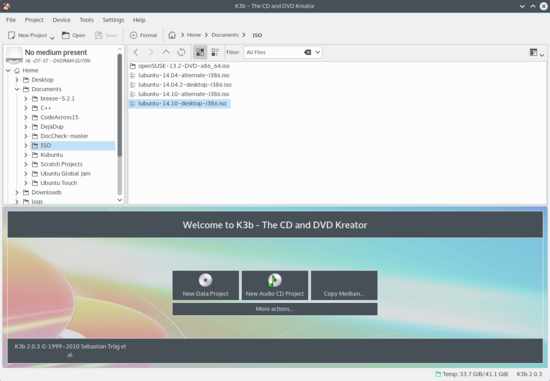 |
Introduzione
Se hai utilizzato un programma di masterizzazione come Nero in Windows, sentirai K3b abbastanza familiare.
Caratterizzato da un'interfaccia semplice ma potente, K3b fornisce varie opzioni per masterizzare un CD, DVD o un BD (disco Blu-ray). Sono supportati vari tipi di progetti inclusi (ma non solo) audio e dati, progetti video per DVD e VCD, così come dischi misti e multisessione. K3b è in grado di cancellare dischi riscrivibili e può eseguire altri compiti complessi come codifica audio video e decodifica.
Impostazioni preliminari
Quando esegui K3b per la prima volta, K3b potrebbe informarti che non è stato trovato un masterizzatore, questo significa che non sarai in grado di scrivere su qualsiasi disco ottico. Non serve lasciarsi prendere dal panico dal momento che K3b aprirà una finestra di configurazione che ti aiuterà tramite vari strumenti di manipolazione utilizzati da K3b. Questa include la visualizzazione del gruppo utente proprietario delle applicazioni. Non dovresti aver bisogno di cambiarlo dal momento che lo stesso K3b applicherà i permessi corretti ai programmi esterni. Questi programmi sono generalmente cdrecord, growisofs e cdrdao. Se si preferisce è possibile dire a K3b di utilizzare il gruppo utenti burning e selezionare il drive ottico. L'immagine qui sotto è la finestra di configurazione dove è possibile effettuare queste impostazioni.
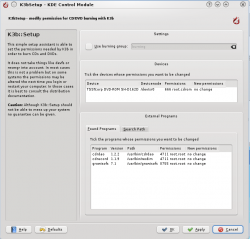
Configurare l'interfaccia utente
All'avvio di K3b ti vengono offerte scorciatoie per le tre operazioni più diffuse
- Nuovo progetto dati
- Nuovo progetto CD audio
- Copia supporto
K3b can perform much more than these tasks though, and so you may find that some of the other possibilities are just as useful to you. Take a look at this list for a taste of other available functions (click on the image to enlarge it):
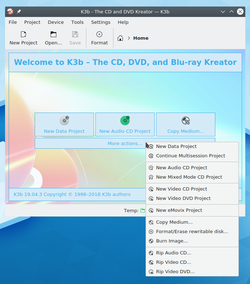
Perhaps a quick start for one or more of these other tasks would be useful to you and so K3b can give you that, too. Simply right click on the application desktop, and here you will see a menu for adding buttons:
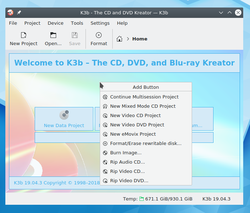
Configuring the internals
Most of the default settings can simply be left alone. It is however, recommended that you do take a look at the Advanced Settings page. Here you can set various important settings, if required.
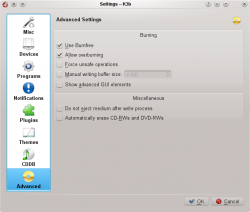
- Use Burnfree should be set - it controls the burn, ensuring that the buffer never gets dangerously low (which reduces the quantity of bad burns).
- You may wish to automatically erase re-writable disks.
- The option Do not eject medium after write process is invaluable if your drive is one that cannot be closed quickly enough for Verify to happen.
Preparing to burn a disk
When starting a new project, you should ensure that K3b has detected the correct optical media, such as CD or DVD. On the status line at the bottom of the screen you should see the size of disk which is currently set. If this is not correct, or you require a different size, simply right-click on it and set the preferred size from the provided list:
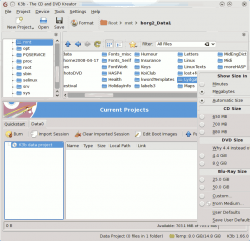
All that's left to do now, is choose what is to be burned. The top half of the screen functions like a file manager. Simply drag and drop the files and directories you wish to burn onto the large pane at bottom right. On the left you will see a tree view forming of your chosen files. Should there be some files or directories which you do not want to burn, these can be easily removed from the project by simply removing them from the panel at the bottom. Select the file to be removed (you can control-click to select multiple ones), then right-click, and select Remove. After this, the bottom left-hand panel should show an updated tree representation of the directories and files.
The top line will be the title of the disk. In many cases this will be fine, but if you would like to change this to something else, simply right-click on the title and rename it.
Final Steps
You are now ready to hit the Burn button.
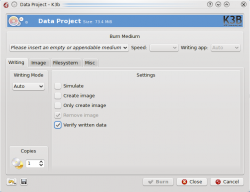
You will see on my screenshot that no disk was present. When you have inserted the appropriate disk you will see a description of it on that line.
There are still one or two choices to be made. I would recommend that you set Verify written data, then hit the Save icon at the bottom of the screen, ensuring that it becomes your personal default. For most modern drives it's safe to leave mode and speed to Auto. If you may wish to burn another copy of the disk at a later date, select Create image, which will save having to set up the burn again. Set the number of copies you want to burn, then, when you are satisfied, hit Burn.
Burning an Audio CD
This page tells you how to burn an audio CD from your stored files.
